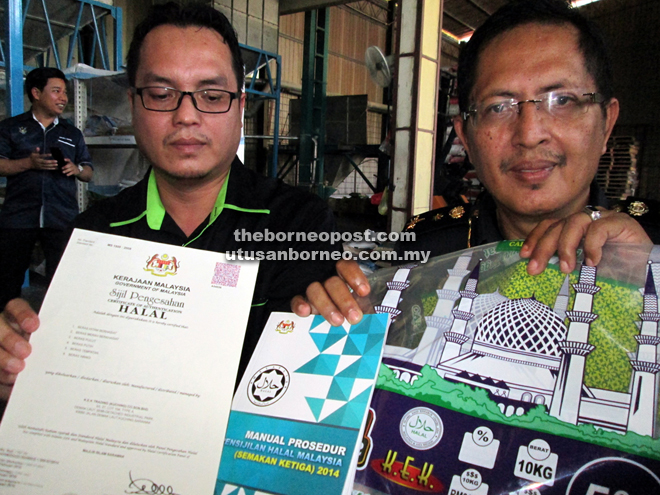
Abdul Hafidz (second right) pointing to a pack of rice with halal logo not recognised by Jais and Jakim. — Photo by Jeffery Mostapa
KUCHING: A rice packaging company was slapped with a RM50,000 fine for using halal logo that is not recognised by State Religious Affairs Department (Jais) and Malaysian Islamic Development Department (Jakim) on seven rice brands.
Sessions Court judge Dayang Ellyn Narisa Abang Ahmad, who presided over the case at the rice packaging warehouse at Demak Laut yesterday where the packed rice were shown as exhibits, imposed the fine on K.E.K. Trading (Kuching) Co Sdn Bhd after the company’s owner pleaded guilty to the charge and appealed for leniency.
She ordered the 1,283 packs of rice valued at about RM51,000 that were seized by the state Domestic Trade, Cooperatives and Consumerism Ministry (MDTCC) on Dec 16 last year to be handed to the ministry for disposal.
The brands of the rice seized were Double Fish Thai Horn Maii, Arowana Fragrant Rice, Rooster Super White, Ibuku Local Sarawak White Rice, Ibuku Vita Brown Rice White Ibuku Vita Brown Rice Red and Beras Pulut.
The company was charged under Order 8(b) Trade Descriptions Order (Halal Certification and Labelling) 2011 of the Trade Descriptions Act 2011 [Act 730] with supplying 1,283 packs of rice bearing the halal logo that is not recognised by Jais and Jakim.
The prosecution was conducted by deputy public prosecutor Nurul Azrina Mohamed Yusof from the state MDTCC.
The rice packaging company was raided on Dec 16 last year by the state MDTCC enforcement team together with Jais officers, who acted based on intelligence gathered.

Abdul Hafidz (right) showing the rice packaging with halal logo that is not recognised by Jais and Jakim and the procedure manual to obtain halal certification from Jakim. On the left is Jais Halal Management Division principal assistant director Khalipah Juli, who is holding the halal certification obtained by K.E.K. Trading (Kuching) Co Sdn Bhd early this year. — Photo by Jeffery Mostapa
All the rice packed by the rice packaging company that were found to be bearing the halal logo that was not recognised by Jais and Jakim since Nov last year were then recalled from the market and then seized.
State MDTCC deputy director Abdul Hafidz Abdul Rahim, when met after the proceeding, said the company had since then applied to use the halal logo from Jais and received halal certification early this year.
“Although the company had obtained halal certification the previous offence still exists.”
Abdul Hafidz, who is state MDTCC enforcement chief, went on to advise consumers, especially Muslims, to ensure that the halal logo on the rice packs they buy is recognised by Jais and Jakim.
“The MDTCC, in cooperation with Jakim and Jais, is always monitoring the usage of halal logo in the market so that the products with halal logo that is not recognised by the two religious bodies are not sold in the Sarawak market. We will also monitor to ensure that the halal logo on the products is genuine.”
Abdul Hafidz encouraged companies to ensure that they had obtained certification from Jais or Jakim before using the halal logo on their products.
“The halal certification issued by other associations, be it in the country or other countries, is not recognised by Jais or Jakim and therefore, the halal logo issued by them is not allowed to be used in our country.”
When asked to comment on food imported from other countries, he said Jakim would visit the venue where the food is processed to ensure that required standards are followed.
“Jakim will go to the places (where the food are processed) to conduct checks if it is according to the required standards before certifying the products halal.”
